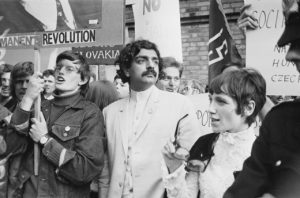David Edgar in the London Review of Books:
Would you say a few things about your family background.

My family belonged to the Khattar tribe in the Attock District. It was a landed family. Genealogists traced its descent from the 11th-century Rajputs whose conversion to Islam began a hundred years later, boosted by intermarriage with the offspring of marauding Muslim adventurers from the North. It was completed two centuries before the Mughals arrived. The head of the clan had the right to keep ten thousand men under arms. By the mid 19th century the family had become a laboratory example of a decaying aristocracy quarrelling over property. Absentee landlordism further complicated matters. My parents, for instance, had no idea how much land they owned but it was a hell of a lot since its sale kept them going for a long time.
Initially both my grandfathers belonged to the faction that supported the British. The big divide in the family began during the Sikh wars, with one side supporting the Sikhs and the other the British. With the first Indian war of independence in 1857 (known in English history books as the Mutiny) there was the same division. I used to think, cynically, that the top echelons of the family did this deliberately: support both sides so that whichever faction of the ruling class wins, the family never loses. That was often the case. Not this time.
More here.
